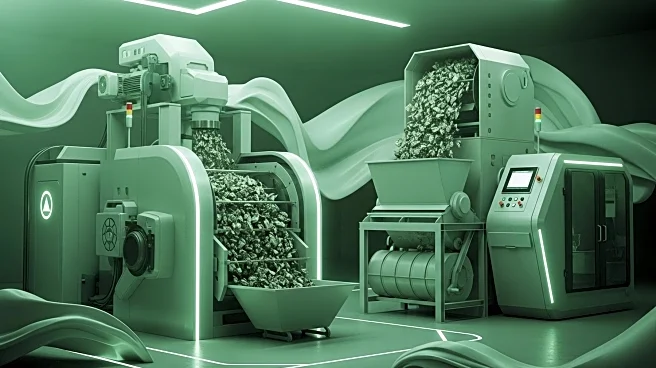What's Happening?
ÄIO, an Estonian startup, has developed a process to convert agricultural waste, such as sawdust, into edible fats for the food and cosmetic industries. Co-founded by biotechnology scientists Nemailla Bonturi and Petri-Jaan Lahtvee, the company utilizes a novel strain of yeast that consumes sugar and outputs fat molecules. This innovation could potentially reduce global reliance on palm oil, which is widely used for its emulsifying and preservative properties but has led to significant environmental degradation. ÄIO has raised approximately $7 million and plans to showcase its technology at TechCrunch Disrupt in San Francisco. The company aims to build a facility for commercial production by 2027 and is seeking licenses to sell its product as food, starting with Singapore.
Why It's Important?
The development of edible fats from agricultural waste by ÄIO represents a significant advancement in sustainable food production. By offering an alternative to palm oil, the startup addresses environmental concerns associated with palm oil cultivation, such as deforestation and ecosystem destruction. This innovation could lead to more sustainable practices in the food and cosmetic industries, potentially benefiting companies seeking eco-friendly alternatives. Additionally, the technology could stimulate economic growth by creating new markets for agricultural waste products, thus providing farmers with additional revenue streams.
What's Next?
ÄIO plans to establish a commercial production facility by 2027 and is working on obtaining necessary licenses to market its product as food. The company is targeting Singapore as its initial market due to its openness to alternative food products. As ÄIO progresses, it may attract interest from major food and cosmetic manufacturers looking to incorporate sustainable ingredients into their products. The startup's participation in TechCrunch Disrupt could further enhance its visibility and attract potential investors and partners.
Beyond the Headlines
The use of agricultural waste to produce edible fats highlights the potential for biotechnology to transform waste management and resource utilization. This approach not only reduces environmental impact but also promotes circular economy principles by converting waste into valuable products. The success of ÄIO's technology could inspire further research and development in similar fields, potentially leading to broader applications of waste-to-product innovations.










